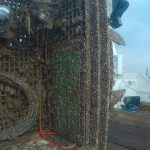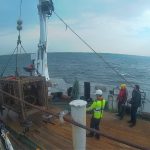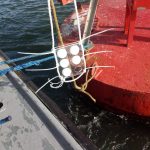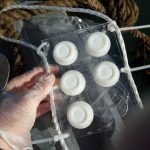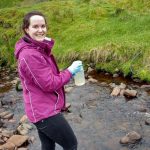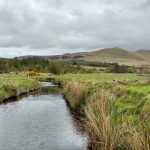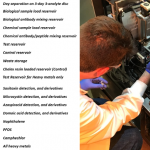Seafest 2018
Event Details
he Water Institute attended the Our Ocean Wealth Summit 2018 and Trade Show to demonstrate some of our current marine based projects. Chloe Richards is an MSc student who is working
Event Details
he Water Institute attended the Our Ocean Wealth Summit 2018 and Trade Show to demonstrate some of our current marine based projects.
Chloe Richards is an MSc student who is working on marine inspired design for antifouling technology who will be showing her deployment frame which will be used in the Galway and Dublin Bay. Her project focuses on overcoming the challenges that biofouling presents in the marine environment. The goal of the project is to use structures and textures found in nature to combat the accumulation of biofouling organisms. She hopes to be able to develop a novel antifouling coating which will be less biocidal than currently available options. Find out more by clicking here.
Martin Nolan is a researcher who is a part of the MONITOOL Interreg project will also be in attendance. The project is based upon Directive 2013/39/EU relating to priority metals in the field of water policy. These include cadmium, nickel and lead. The MONITOOL project aims to define and outline suitable Environmental Quality Standards (EQS) to allow for the use of Diffusive Gradient in Thin Film (DGT) passive samplers for the monitoring of these metals. Find out more by clicking here.
Management and conservation of fish species requires knowledge of their distribution. Traditionally this is done by visual detection and counting. Molly Williams aims to develop a novel biosensor which would detect environmental DNA (eDNA) from a water sample. DNA was chosen as the target for the biosensor due to the high potential selectivity and sensitivity. The method Molly is developing allows for on-site monitoring without direct interaction with the fish, reducing potential harm to the valuable species. Find out more by clicking here.
The MARine environmental in situ Assessment and monitoring tool BOX is an FP7 EU-funded project tasked with the development of multiple analytical devices which could form a neural network for marine-based in-situ sensing of chemical and biological pollutants using novel biosensors. DCU WI’s Dr. Jenny Lawler and Ivan Maquire developed microfluidic disks capable of detecting toxins in water samples. This TOXISENSE sensor can be seen at our stand at Seafest 2018. To find out more about the MARIABOX project click here.
Thank you to the Marine Institute and all other organisers for the amazing event. We hope to attend next year.
more
Time
June 13, 2018 All Day(GMT+00:00)
